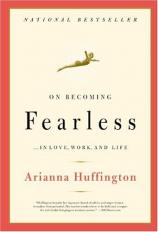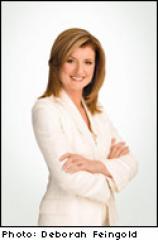Reading Group Guide
Discussion Questions
On Becoming Fearless... In Love, Work, and Life

1. For the person in your group who chose On Becoming Fearless, what prompted this selection? If you were not the one who selected the book, are you pleased to have read it? Why or why not?
2. Arianna Huffington shares many personal stories and anecdotes in this book. Were you surprised at her level of honesty? Did learning about her struggles and triumphs impact your view of how fearlessness can be achieved? How so?
3. Discuss the ways in which the media influences society's ideas about physical appearance, aging, motherhood, and professional development as it pertains to women.
4. Share one positive influence or role model, either from On Becoming Fearless or of your own choosing.
5. "Intelligent, smart, talented, hardworking women allow themselves to be lost in the quest for one man's approval (43)," writes Huffington. Why is women's self-image so often tied in to what men --- in many instances one particular man --- think of them? Why do you suppose some women (even "fearless" ones) act weak in order to appear more attractive to men?
6. Huffington, the mother of two daughters, writes that in the modern era "all of our traditional fears about our children's safety and well-being are multiplied and magnified" (59). How is parenting in today's world different than it was a generation ago? Do you find it helpful to talk to other parents and share advice? What are some things parents can do to foster fearlessness in their children?
7. Each chapter begins with a woman's story about fearlessness, from writer Nora Ephron to actress Diane Keaton to Kathy Eldon, a documentary producer whose photographer son was murdered by a mob in Somalia. In what ways did these stories add to the experience of reading this book? Which story impacted you the most?
8. "There is a professional double standard so that the same behaviors that help men get ahead and prove their worth on the job are discouraged in women" (90). What are these double standards, and why do they persist? Do you agree with the author that the responsibility for double standards in the workplace lies with both men and women? How so?
9. Fearlessness in a sense starts with our physical well-being. "When we feel strong, when our bodies are healthy, we don't feel as vulnerable as when we are weak and out of shape," says Huffington. "It's harder to feel fearless when we become breathless climbing up a flight of stairs" (28). Has reading this book inspired you to improve your physical health as a step toward becoming fearless?
10. In some instances women are held back not only by their own self-censors but by the fear of society's censure, leading to "the primal fear of being shunned by the tribe" (47). How much influence does the fear of nonconformity have on women's decision-making?
11. How important is it to have a fearless role model in one's life? What is your opinion of Huffington's mother, whom the author talks about throughout the book? In what ways did she contribute to her daughter's fearlessness?
12. When you were a child, unaware of the idea of "fearlessness," were you naturally fearless? If so, what memories do you have of acting fearless as a child?
13. What is your overall impression of On Becoming Fearless? Of the areas explored the book --- body and looks, love, parenting, work, money, aging and illness, death, and leadership --- which one resonated with you the most? Why?
14. Do you have a group of women who you reply upon on for support? Do these women make you fearless? Share stories of how these women have inspired you.
15. Did you come away with any concrete advice to apply to your own life after reading On Becoming Fearless? If so, share with the group what you'd most like to accomplish.
On Becoming Fearless... In Love, Work, and Life
- Publication Date: April 9, 2007
- Genres: Self-Help, Women's Studies
- Paperback: 240 pages
- Publisher: Little, Brown and Company
- ISBN-10: 0316166820
- ISBN-13: 9780316166829








